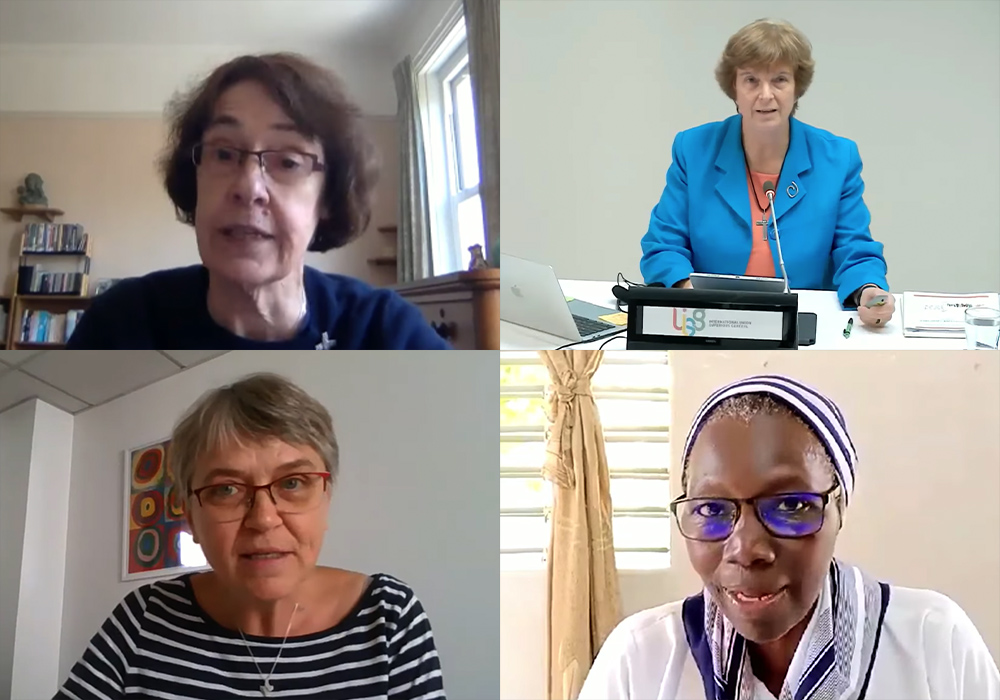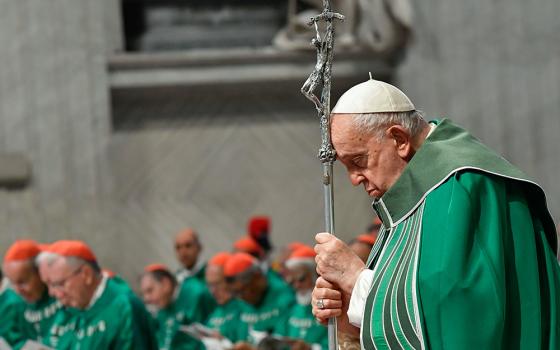
Speakers at a Sept. 25 event organized for members of the women's International Union of Superiors General and the men's Union of Superiors General included (clockwise from upper left): Congregation of Jesus Sr. Gill Goulding, Sacred Heart of Jesus Sr. Maria Cimperman, Immaculate Assumption of Castres Sr. Anne Béatrice Faye and Xavière Sr. Christine Danel (GSR screenshots/YouTube/UISG)
As Pope Francis kicks off a monthlong summit on the future of the Catholic Church, religious women and men from around the globe are looking to see a real commitment toward "co-responsibility in mission" as church leaders consider the relationship between laity and ordained ministers.
"It is important that lay life, religious life and the priesthood are all seen as complementary as a reciprocity of service," said Congregation of Jesus Sr. Gill Goulding.
"Priests are called forth from the wider people of God in order to return to serve the people of God," added Goulding, a professor of systematic theology and spirituality at Regis College and the University of Toronto.
Goulding's remarks came during a Sept. 25 event organized for members of the women's International Union of Superiors General (UISG) and the men's Union of Superiors General (USG).
The meeting, the second of three planned online gatherings, was livestreamed. It spotlighted various continental perspectives on this October's Synod of Bishops, which began at the Vatican Oct. 4.
The event offered perspectives from every continent on what Sacred Heart of Jesus Sr. Maria Cimperman described as "listening to the wide body that is the church."
Cimperman, who is a coordinator for UISG's synodal activities and one of some 40 women religious participating in the Oct. 4-29 assembly in Rome said the goal of the synod is to effectively ask: "Who is church and what does it mean to be church?"
During the nearly two-hour event, each speaker reflected on various insights from their respective region gained during the synodal process.
Xavière Sr. Christine Danel spoke of how despite declining numbers of Catholic priests and religious life in France there is also dynamism found throughout the country, specifically among ministries among the poor, the disabled and refugees, and on ecological matters.
Advertisement
Danel said that while there is a lot of "creativity" used to reach these groups, it is also important to "receive from them, too," and that opportunities must be provided for women to be more visible in liturgical practices, including preaching when properly trained.
"We have to promote a church where men and women are appreciated equally," Danel told attendees.
She also spoke of the ongoing response to clergy sexual abuse, where a 2021 report found that an estimated 330,000 children were victims of sex abuse at the hands of French Catholic priests and church leaders over the last 70 years.
Society of the Divine Word Fr. Paul Budi of Indonesia reflected how in Asia it is a common practice for guests to take off their shoes before entering someone's home.
In the same sense, he said, genuine co-responsibility and collaboration in the church requires "respect, trust, humility."
Budi especially emphasized the need for greater efforts to be made during formation for religious life in the virtue of humility through better programs meant toward improving dialogue, including increasing exposure to nonbelievers.
The goal, he said, should be to produce "women and men of dialogue."
Argentine Sr. Daniela Cannavina, a member of the Congregation of the Capuchin Sisters of Mother Rubatto, echoed those thoughts, speaking of the "paramount" need to become better practiced in intercultural relations.
That point was further reiterated by Comboni Sr. Anna Maria Sgaramella who works in the Holy Land and emphasized that the synod process must reconsider the role of dialogue both inside and outside of the church.
Sandie Cornish, a theologian at Australian Catholic University, said that synodality forces the church to consider the whole people of God, which necessitates an examination of clericalism, women's participation in ministries, the lack of transparency in the church, and how "new ministries and roles may need to be created or recognized," including the possibility of the restoration of the female diaconate.
Immaculate Assumption of Castres Sr. Anne Béatrice Faye of Senegal said the church cannot be shy about walking together with those sometimes considered outside of the fold of the Catholic Church.
"The mission of the church is to help people to abandon their old habits ... and embrace the word of God," said Faye. "Synodality is, by its essence, missionary."







